‘The Confessions Of Frannie Langton’ Star And Writer Discuss The Complicated Dynamics Of Telling A 19th Century Interracial ‘Love Story’
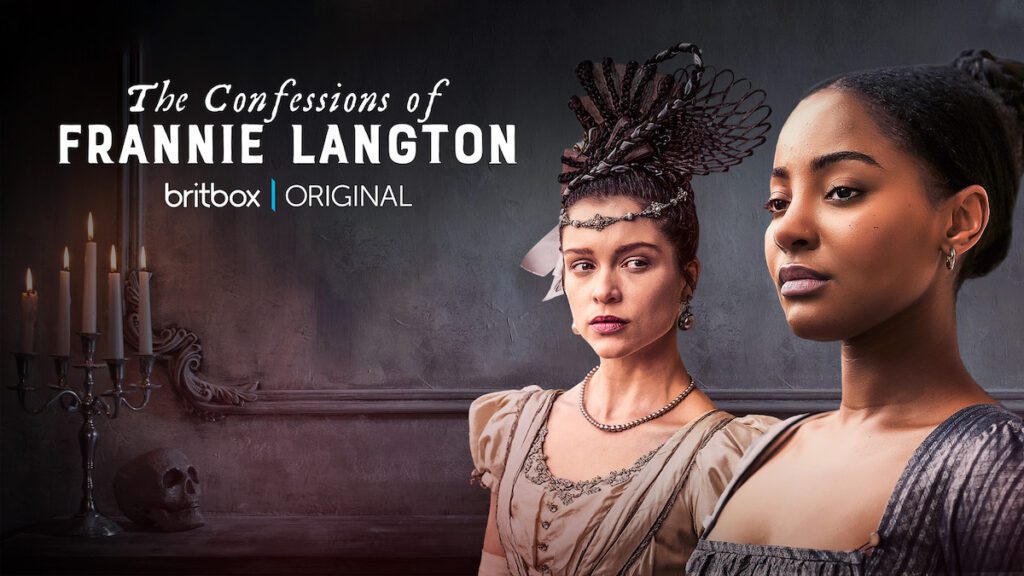
Just a few weeks ago we introduced you to the British series The Confessions of Frannie Langton and earlier this month we got to speak with Sara Collins, who wrote the tv series based on the novel she authored.
Source: Courtesy / BritBox
We also got the chance to chat with Karla-Simone Spence, the actress who stars in the four-part television series The Confessions of Frannie Langton which premiered on BritBox earlier this month.
As we previously reported, The Confessions of Frannie Langton narrates Frannie’s journey from a Jamaican plantation to the grand Mayfair mansion of celebrated scientist George Benham and his exquisitely beautiful wife: Madame Marguerite Benham. In a misguided and monstrous gesture, Frannie is gifted to Benham by the man who owns her, John Langton, and she is employed as a maid in the household.
As the plot twists and turns, events take a fateful turn as the Benhams are found murdered in their beds, with Frannie lying next to Marguerite. Frannie is accused of murder but swears that she couldn’t possibly have killed her mistress because she was devoted to her. Dragged away to prison, Frannie attempts to piece together the events of that night. She is deep into a laudanum addiction and unclear about precisely what happened.
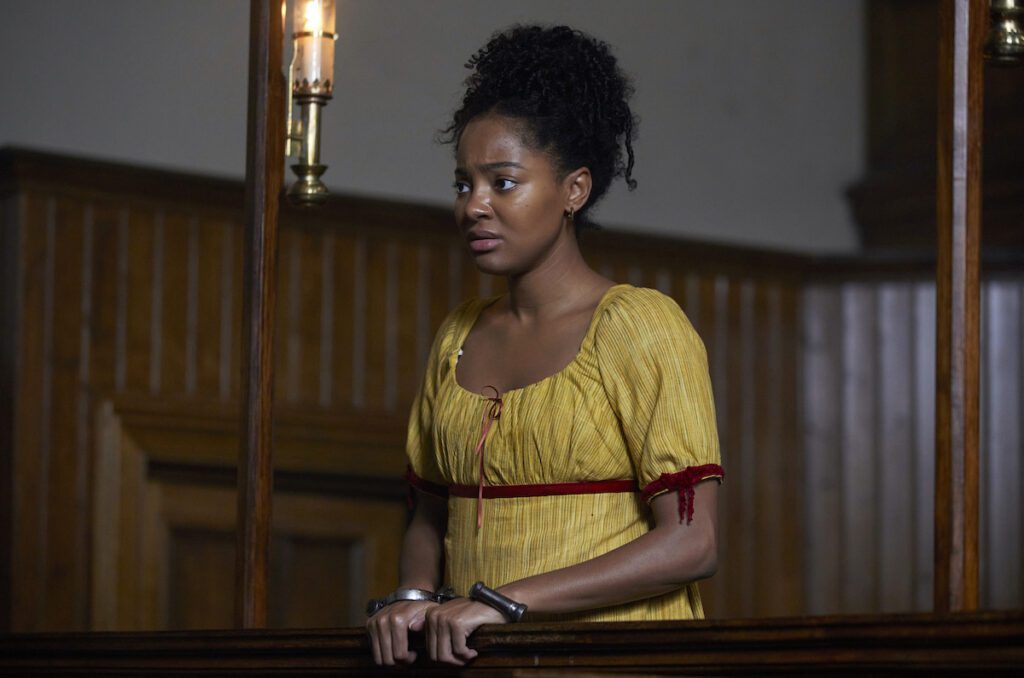
Source: Courtesy / BritBox
After watching The Confessions Of Frannie Langton we had to ask Sara Collins what inspired the concept of the novel and how it felt to adapt her work for the small screen.
“I have been a lifelong bookworm,” Collins told Global Grind. “I was obsessed with stories like this when I was younger. I read and reread Wuthering Heights and Jane Eyre once a year. I think I kind of subconsciously have always been aware since then that I was loving something that wasn’t loving me back. You know what I mean? Why was I obsessed with these stories where I, or a woman like me, just didn’t feature at all? That’s kind of a fact of a young Black girl’s life, or it was for me — I keep saying to my daughters, who are in their twenties now, that it’s so much better for your generation. But it left me with this kind of sense that if you get the chance to write something that you can fill those gaps? I don’t just read to fill gaps, I write to fill gaps. You have the power to put yourself or someone like you in these circumstances, and so for me that’s really what brought me to bringing Frannie to the page.
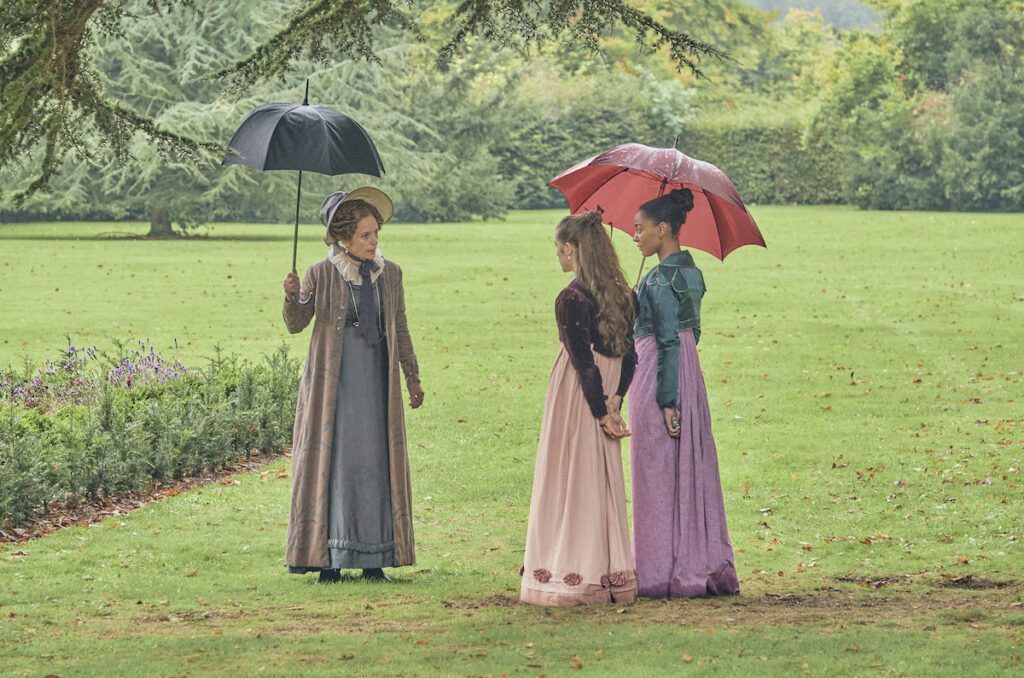
Source: Courtesy / BritBox
As you can probably imagine, Collins was worried, as most authors likely would be, that her pages might not translate as well to the screen but fortunately for us, her literary agent was able to persuade her to meet the challenge head on.
“Bringing her to the screen, I did not want to do it,” Collins admitted. “I just wasn’t convinced it would b a good idea. I thought the book was too literary. I always like the book better than the tv series. Didn’t want the tv series to spoil the experience of my having made the book. And I can say all of this now that there is a happy ending to this story. My mind has been completely changed. The experience of seeing this. I’m so glad I did because it’s such a privilege to be able to experience and actress like Karla Simone showing me aspects of the character that I didn’t know were there and being able to bring the character to life for me in a way that I don’t think that I could have just on the page. I’m really grateful to her and really blown away by her performance and hope that viewers will be as well.”
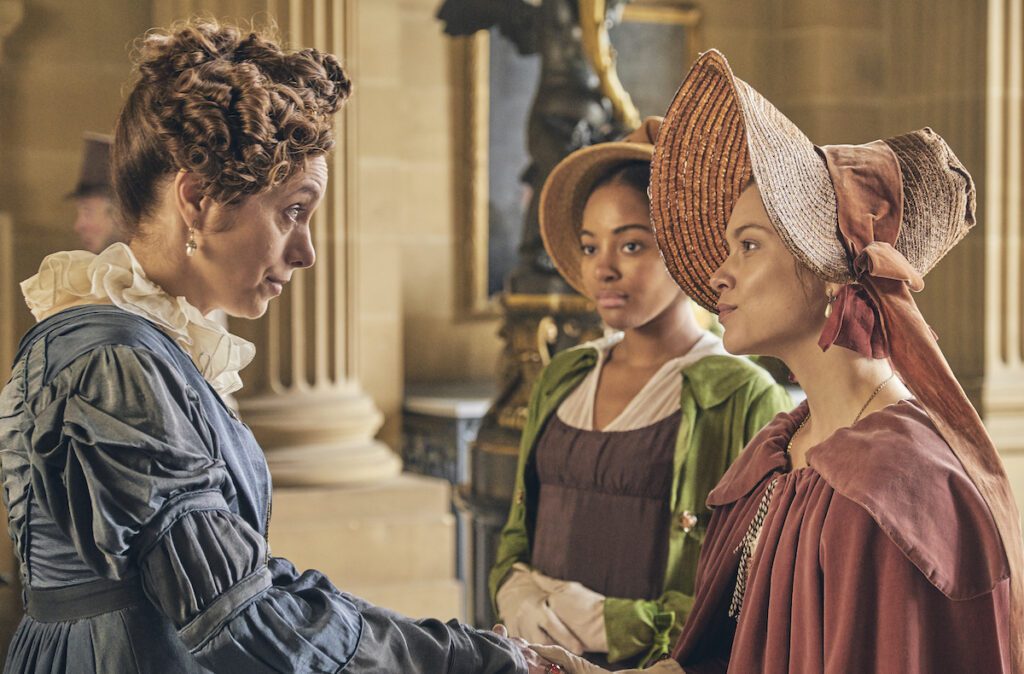
Source: Courtesy / BritBox
Karla-Simone Spence faced a far different challenge in tackling the role of Frannie Langton, because while her source material offered her a wealth of background information about her character, she hails from an entirely different world than Frannie, who faced challenges beyond most people’s imagination.
“In preparation, I quite enjoyed preparing for Frannie, because I had so much content and material from Sara to kind of work from,” Spence told Global Grind. “It was great for me because it made my job easier and I just got to add loads of intricate details about her to that. A lot of the time you have to create your own back story and flesh out the character. I had a couple of months to kind of create Frannie from that before filming.”
“I think the more challenging part is bringing it to life and getting it on it’s feet and doing her justice,” Spence added. “It was probably the darker points in her story — when she really goes through it. She goes through a lot, just feeling that and experiencing that and being like ‘Oh that’s what it’s like to go through that,’ like Sara says society has gotten much easier than before and what Frannie goes through, I’ve not personally gone through it and am hugely grateful that I haven’t. So to kind of go on that journey with her was really transformative and really informing to who she is as a person. I enjoyed it. It was really cathartic for me. I felt like I was going on this weird journey with her personally. Also to be able to like cry and let it all loose.”
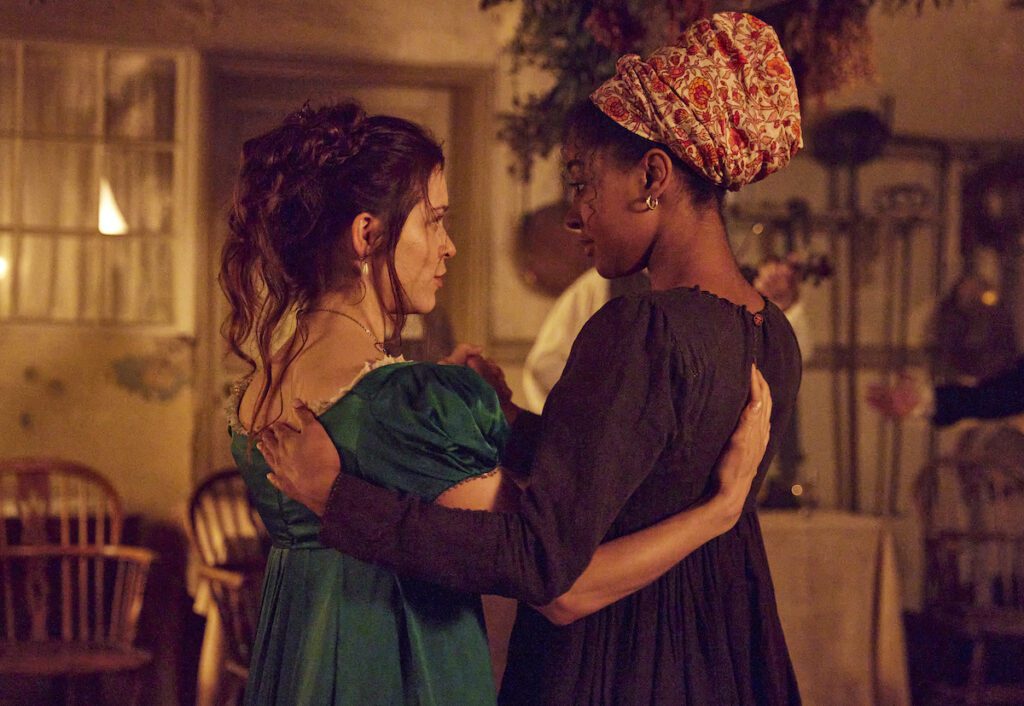
Source: Courtesy / BritBox
While most of us have heard stories of sexual relationships between Black women who were enslaved and the men who owned them, the dynamic is slightly different in Frannie’s case, where the lady of the manor is the one engaging with her romantically. We asked both Karla-Simone and Sara about the implications of this relationship, which required a different approach from each of them.
“For me, I had to look at it from Frannie’s perspective and approach it in the romanticized version because from Frannie’s lens, she’s very much in love with this woman and she doesn’t see the power dynamic,” Spence told Global Grind. “She’s very aware that Madame is her employer but she did feel like her equal and she does feel like this woman loves her and that they can connect on an intellectual level, but she’s the one. Frannie believes that she’s the one.That’s how I approach But Sara can speak on the outside looking in.”
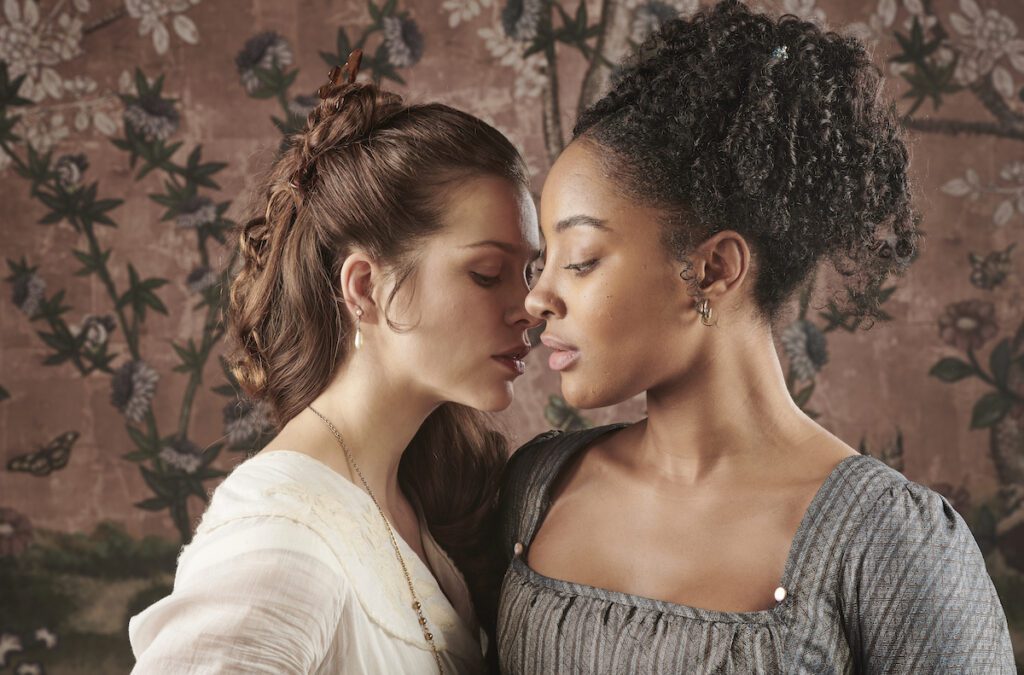
Source: Courtesy / BritBox
“It’s interesting to hear you say that Karla, because from her own perspective of course it’s love and that’s the key to it, but she’s going to experience it differently from people on the outside,” Sara responded. ” I always think of it like, if you have that first toxic boyfriend and your friends are all saying, ‘He’s no good for you girl,’ but you won’t hear anything that contradicts your version of events. There is a contradiction there, but it was really important for me to think about…”
“I think it’s kind of brave as well,” Sara added. “It is kind of brave to engage on screen with love in the context of this power dynamic. It’s not something I’ve seen done before. It’s quite a difficult line to navigate. I think that’s one of the reasons why it’s two women, because I think the power dynamic becomes more interesting but it’s also I think realistically the only way you can navigate it onscreen. They are two women. Madame Benham, Frannie’s love interest also feels oppressed and is unaware of her own privilege. That to me sounds really familiar in a 21st-century context as well, that people are generally unaware that they have a blind spot when it comes to their own privilege. Madame is moaning about all of her own trouble and kind of expecting Frannie to save her. And I just thought this is a kind of interesting way to play with the stuff that we still debate now about intersectionality, about interracial romance, about loving yourself before you can love someone else and all of those things that have been plaguing us since the 19th Century and beyond.”
We’re glad that Sara mentioned how people so frequently fail to see their own power and privilege. Do you think it’s because they’d rather choose not to? Or is it just a failure in perspective? This series is definitely one designed to make people think more deeply about race, gender and societal norms.
While we’re on the subject of gender, we made sure to recognize that em>The Confessions of Frannie Langton is a female led production, written and exec-produced by the novel’s author Sara Collins, produced by Carol Harding, directed by Andrea Harkin and with Rebecca de Souza executive producing alongside Greg Brenman, when we were interviewing Collins and Spence.
“Amen! I didn’t even think of that,” Collins told GlobalGrind. “I just took it for granted.”
“It was really incredible,” Spence added of the female-led experience. “I think it helps to creates a level of understanding and a safe space. Working with Andrea, the director, she was really collaborative and really generous in terms of like, if we have a scene and we wanted to go a certain way and she’d be up to listening to that, rather than just having her vision of this and this is how she wants it. I feel like even if I needed to speak to Sara about anything I could message Sara. Everyone was working together. I think you can always tell as well by the gaze of the show, of who is at the helm.”
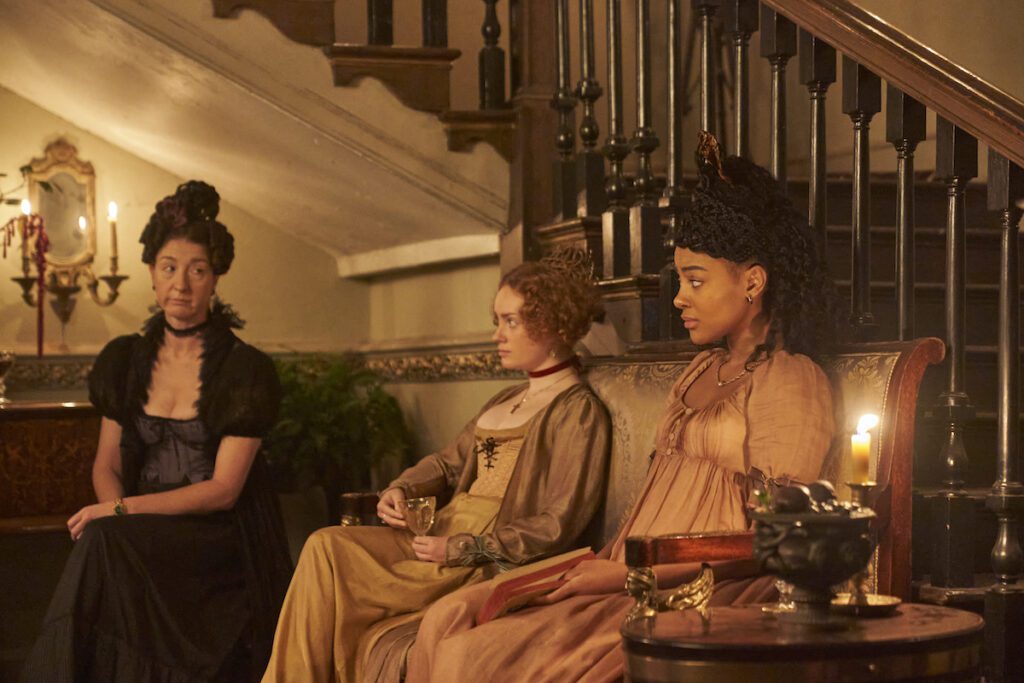
Source: Courtesy / BritBox
“I think that’s so important,” Sara Collins added. “Really there has never been a better time to be a woman. So it’s really exciting to engage with female creatives. We still have a long way to go. We may have been lulled into a false sense of security on this project. We still have a long way to go though in terms of making sure that women and Black women in particular are really in the seat where the money is, really calling the shots about what gets financed and how much space is given to those projects in terms of how things are distributed. I love it but I’m still also on my soapbox about all of that stuff as well.”
All four parts of The Confessions of Frannie Langton are currently streaming on BritBox.







